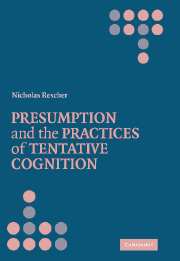Book contents
- Frontmatter
- Contents
- Preface
- Presumption and the Practices of Tentative Cognition
- 1 The Legal Roots Of Presumption
- 2 Presumption and Burden of Proof
- 3 Cognitive Presumption and Truth
- 4 Validating Cognitive Presumptions
- 5 Presumption and Inquiry
- 6 Default Reasoning
- 7 Presumption and Trust
- 8 Presumption and Communication
- 9 Presumption in Science and Beyond
- 10 Specificity Prioritization and the Primacy of the Particular
- 11 Dismissing Extremely Remote Possibilities
- Conclusion
- Bibliography
- Index of Names
5 - Presumption and Inquiry
Published online by Cambridge University Press: 24 July 2009
- Frontmatter
- Contents
- Preface
- Presumption and the Practices of Tentative Cognition
- 1 The Legal Roots Of Presumption
- 2 Presumption and Burden of Proof
- 3 Cognitive Presumption and Truth
- 4 Validating Cognitive Presumptions
- 5 Presumption and Inquiry
- 6 Default Reasoning
- 7 Presumption and Trust
- 8 Presumption and Communication
- 9 Presumption in Science and Beyond
- 10 Specificity Prioritization and the Primacy of the Particular
- 11 Dismissing Extremely Remote Possibilities
- Conclusion
- Bibliography
- Index of Names
Summary
Presumptions in Rational Inquiry
Without some recourse to presumption we simply could not manage to obtain the informative inputs indispensable for answering our questions about factual issues. Some degree of presumption (however small) incredibly attaches to our procedurally validated truths throughout the factual area where defeasibility is virtually inescapable. This becomes clear once one considers the issue of the observational inputs essential to inquiry in the factual domain. If their status always had to be that of established truths, we could never get off the ground, since observational experience just does not work like that. Thus if an “ordinary process of inferential reasoning” were at issue here, we would be in deep trouble as any such process can only extract truths from truths, and if the inputs themselves had to be established truths, the whole process would be vitiated at the outset. Happily this is not so. An inquiry procedure is clearly not an “ordinary process of inference”: it must afford an originative mechanism, capable of yielding an output of (putative) truths without demanding an initial input of previously established (putative) truths. Clearly if we hewed to the line that rationally discursive procedures can only extract truths from truths, we would be offered the unattractive choice between (1) accepting a “starter set” of nondiscursively self-evident or self-validating truths, or (2) a skepticism that admits defeat and gives up the whole project of a rational validation of truth-acceptance. This dilemma can be addressed effectively by resorting to presumptions.
Information
- Type
- Chapter
- Information
- Presumption and the Practices of Tentative Cognition , pp. 64 - 75Publisher: Cambridge University PressPrint publication year: 2006
